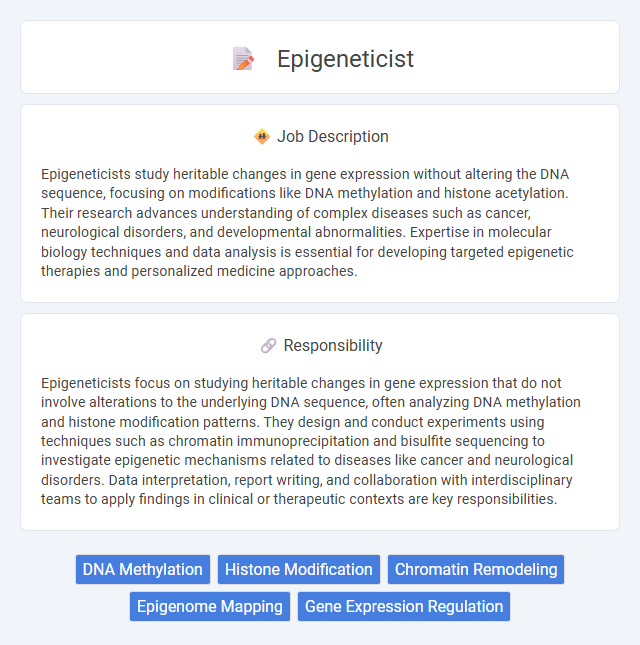
Epigeneticists study heritable changes in gene expression without altering the DNA sequence, focusing on modifications like DNA methylation and histone acetylation. Their research advances understanding of complex diseases such as cancer, neurological disorders, and developmental abnormalities. Expertise in molecular biology techniques and data analysis is essential for developing targeted epigenetic therapies and personalized medicine approaches.
People with a strong interest in biology and genetics are likely to be well-suited for a career as an epigeneticist, especially if they enjoy detailed research and data analysis. Candidates who thrive in laboratory environments and possess patience for conducting experiments and interpreting complex molecular data may find this job fulfilling. Those who prefer fast-paced, interpersonal roles might find the specialized, technical nature of epigenetics less suitable.
Qualification
Epigeneticists typically hold advanced degrees such as a Ph.D. or Master's in genetics, molecular biology, or related biomedical sciences, demonstrating expertise in DNA methylation, histone modification, and chromatin remodeling. Proficiency in laboratory techniques like PCR, sequencing technologies, and bioinformatics tools is essential for analyzing epigenetic data. Strong analytical skills and experience with experimental design, data interpretation, and scientific communication are critical qualifications for success in this specialized field.
Responsibility
Epigeneticists focus on studying heritable changes in gene expression that do not involve alterations to the underlying DNA sequence, often analyzing DNA methylation and histone modification patterns. They design and conduct experiments using techniques such as chromatin immunoprecipitation and bisulfite sequencing to investigate epigenetic mechanisms related to diseases like cancer and neurological disorders. Data interpretation, report writing, and collaboration with interdisciplinary teams to apply findings in clinical or therapeutic contexts are key responsibilities.
Benefit
Epigeneticist positions likely offer opportunities to engage in cutting-edge research that could advance understanding of gene regulation and disease mechanisms. These roles may provide access to state-of-the-art laboratories and collaborative environments conducive to scientific innovation. There is a strong probability of contributing to the development of targeted therapies that could significantly impact patient outcomes and public health.
Challenge
Epigeneticist roles likely involve the challenge of deciphering complex gene-environment interactions that influence gene expression without altering the DNA sequence. Navigating the vast amounts of epigenomic data to identify meaningful patterns may often require advanced analytical skills and innovative thinking. The evolving nature of epigenetic research suggests ongoing challenges in developing precise techniques and translating findings into practical medical applications.
Career Advancement
Epigeneticists can advance their careers by gaining expertise in cutting-edge genomic technologies and bioinformatics, which enhance research capabilities in gene expression regulation and disease mechanisms. Pursuing higher academic qualifications such as a Ph.D. or postdoctoral fellowships often leads to leadership roles in academic, pharmaceutical, or biotech research institutions. Professional growth is accelerated by publishing influential studies, securing research grants, and collaborating on interdisciplinary projects involving genetics, molecular biology, and epigenetics.
Key Terms
DNA Methylation
Epigeneticists specializing in DNA methylation investigate the addition of methyl groups to cytosine bases within CpG dinucleotides, a key mechanism regulating gene expression without altering the DNA sequence. Their work involves analyzing methylation patterns to understand developmental processes, disease progression, and environmental impacts on the genome. Advanced techniques such as bisulfite sequencing and methylation-specific PCR enable precise mapping of methylation changes critical for therapeutic target discovery and biomarker development.
Histone Modification
Epigeneticists specializing in histone modification analyze chemical changes to histone proteins that influence gene expression without altering DNA sequences. They employ techniques such as chromatin immunoprecipitation sequencing (ChIP-seq) to map histone marks and understand their role in cellular function and disease progression. Expertise in histone acetylation, methylation, and phosphorylation enables these researchers to develop novel therapeutic strategies targeting epigenetic dysregulation in cancer and other disorders.
Chromatin Remodeling
Epigeneticists specializing in chromatin remodeling investigate the dynamic modifications of chromatin structure that regulate gene expression without altering the DNA sequence. Their work involves analyzing histone modifications, nucleosome positioning, and the role of chromatin remodeler complexes such as SWI/SNF and ISWI in cellular differentiation and disease mechanisms. Expertise in techniques like ChIP-sequencing, ATAC-sequencing, and CRISPR-based epigenome editing is essential for advancing understanding and therapeutic interventions in cancer, developmental disorders, and epigenetic inheritance.
Epigenome Mapping
Epigeneticists specializing in epigenome mapping analyze chemical modifications on DNA and histone proteins that regulate gene expression without altering the genetic sequence. They utilize advanced technologies such as ChIP-sequencing, bisulfite sequencing, and ATAC-sequencing to generate high-resolution maps of epigenetic marks across the genome. These comprehensive epigenomic profiles are crucial for understanding mechanisms underlying development, disease progression, and potential therapeutic targets.
Gene Expression Regulation
Epigeneticists specialize in studying gene expression regulation through modifications such as DNA methylation, histone modification, and chromatin remodeling that do not alter the DNA sequence but significantly impact cellular function and development. Their work involves analyzing epigenetic mechanisms that control gene activity in various biological processes, including disease progression and environmental responses. Advanced techniques like bisulfite sequencing and ChIP-sequencing are routinely employed to investigate epigenetic patterns influencing gene expression in both normal and pathological states.
 kuljobs.com
kuljobs.com